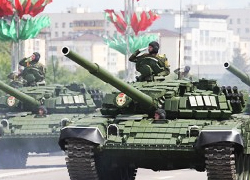Western credits for Belarus spent on military union with Russia
25- 6.02.2010, 16:37

Cooperation with Belarus is named a priority by the new military doctrine of Russia. Russia also claims the right to use its army outside the country.
The text of the doctrine has been signed by Russian President Dmitry Medvedev. The doctrine includes coordination of activities of Belarus and Russia in the sphere of development of the national military forces and use of military infrastructure. The document also proclaims the necessity to create and harmonize measures for maintaining the defensive capacity of the “union state” in line with the military doctrine of the “union state”.
Uniting efforts and creating the collective forces “for ensuring collective security and common defense with other states which are members of the CIS, promoting regional and international security and peacekeeping activities implementation” are names the priority of the military and political cooperation with the member states of the Collective Security Treaty Organization (CSTO).
Since now Russia views a military attack to a member country of the “union state” or any other actions with the use of military force against it as an act of aggression against the entire “union state” and is to take retaliatory measures.
The document also states that Russia views a military aggression against a CSTO member state as acts of aggression upon all the CSTO countries and would take measures under the Collective Security Treaty in this case.
Russia reserves its right to use nuclear weapons in response to use of nuclear and other mass destruction weapons against it or (and) its allies, and also in case of aggression upon Russia by conventional weapons, when the existence of the state itself is endangered.
Besides, the new military doctrine of Russia makes provisions for the right of Russia to use its military forces outside the country for protecting interests of Russia and its citizens.
The doctrine enumerates the main military threats for Russia: the NATO’s growth due to new members, the ABM systems deployment, “exacerbation of military and political situation and intergovernmental relations and creation of conditions for use of military force”.
This document was criticized by NATO Secretary-General Anders Fogh Rasmussen. He is sure that the new Russia’s military doctrine, which calls the NATO enlargement and the ABM systems deployment, is not sufficiently anchored in the real world.
“I have to say that this new doctrine does not reflect the real world… NATO is not an enemy of Russia,” NATO Secretary-General Anders Fogh Rasmussen told Reuters in an interview on the sidelines of the Munich Security Conference on Saturday, January 6. “It does not reflect realities and it is in clear contradiction with all our endeavors to improve the relationship between NATO and Russia.”
A note by charter97.org: The new military doctrine of Russia and the place of Belarus in it confirm that all the attempts of the West to make the Belarusian dictator to turn his face toward the West have failed. In response to stepping up contacts of the European Union’s officials with Minsk and to their policy of conciliation in the issue of human rights violations by the Belarusian authorities, the single air defense system of Belarus and Russia have been finally formed over the last year, and agreement on the CSTO Collective Rapid Response Force (CRRF) has been signed; the largest military exercise aimed against the European Union has been held at the territory of Belarus, the Customs Union which is the basis of the Eurasian unification and the Soviet Union restoration has been revived.
These are the spheres on which the credits of the International Monetary Fund allocated to the Belarusian government are spent now: the large-scale joint military exercises with Russia, the pompous military parade held on July 3, 2009; support to numerous punitive agencies like interior troops, police, the KGB, all kinds of special forces and the personal security service of the dictator and of military units of the CRRF, which have been primarily set up for crackdown of mass protests amid the crisis in the CSTO countries.










